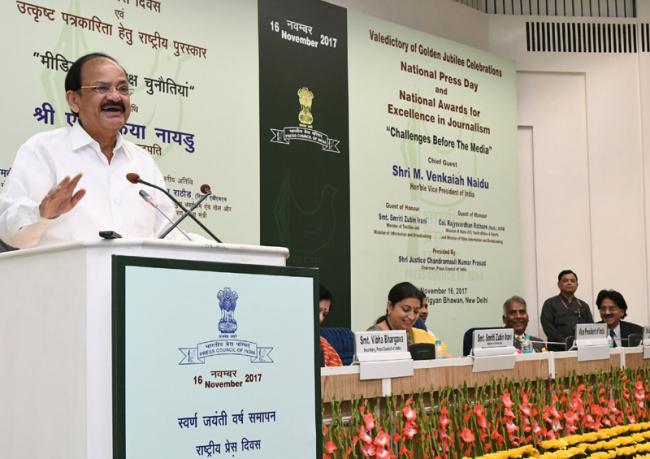
Literacy gives greater freedom to participate in society more actively: Venkaiah Naidu
New Delhi, July 30 (IBNS): Vice President M. Venkaiah Naidu has said that literacy gives greater freedom to participate in society more actively and access better learning and earning opportunities.
He was addressing the gathering after conferring the Nehru and Tagore Literacy Awards instituted by the Indian Adult Education Association, here on Monday.
The Vice President said that it is indeed a glaring gap in world development that one third population of the world is illiterate.
He further said that India has made rapid progress over the last seven decades and the country has tried to ensure universal primary education and literacy.
Quoting the 2011 census report, he said that the literacy rate of the country was 73%, with male literacy at 80.9% and female literacy at 64.6%.
Stressing on the need to remove gender gaps in literacy and education, the Vice President said that one must recognize that there is a persisting gender gap of 16.3 percent and analyze the outcome of the literacy programmes implemented in this country such as Saakshar Bharat so that all the stakeholders can take-up the remaining task in the days to come in a sustainable way.
He asked the government, the civil society, the private sector and the media to work together to create a literate society, a knowledge society & a learning society.
The Vice President said that he is saddened by reports that reflect the predominance of rote memorization, lack of learning materials and inadequate attention to different dimensions of learning.
He highlighted on the need to rethink education system and schools to review what is taught and how it is taught.
"Schools and colleges must get transformed into active, vibrant places of learning where students experience the joy of learning," he added.
The Vice President said that the country must move on from universal functional literacy to skill development and lifelong learning.
He further said that learning is a continual process and we need to develop an efficient programme involving all the stakeholders to achieve the goal of building a learning society.
The Vice President said that 65% of the country’s population is 35 years of age or under and by 2020 and it is forecasted to become the youngest country in the world, with a median age of 29 years.
He further said that this is a crucial moment in India’s developmental journey.
"We must realize the demographic dividend. We must focus on the youth and ensure that they have the requisite skills to shape their futures in the knowledge economy of the 21st century," he added.
Support Our Journalism
We cannot do without you.. your contribution supports unbiased journalism
IBNS is not driven by any ism- not wokeism, not racism, not skewed secularism, not hyper right-wing or left liberal ideals, nor by any hardline religious beliefs or hyper nationalism. We want to serve you good old objective news, as they are. We do not judge or preach. We let people decide for themselves. We only try to present factual and well-sourced news.







